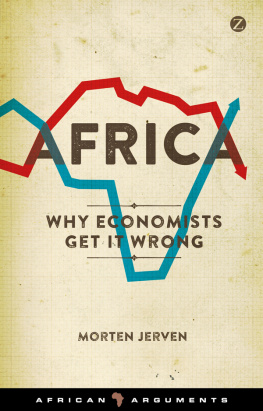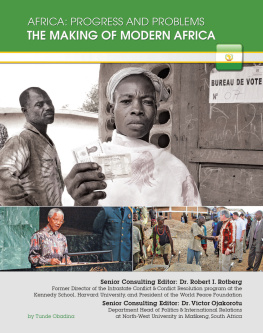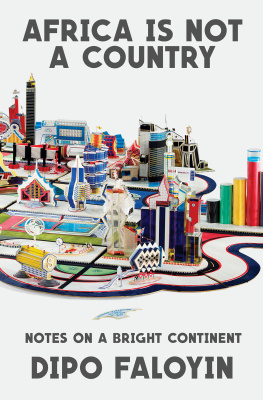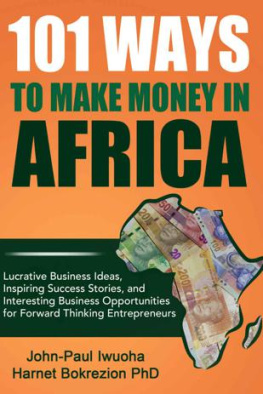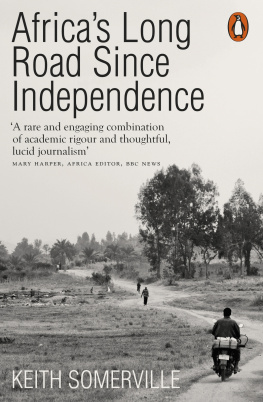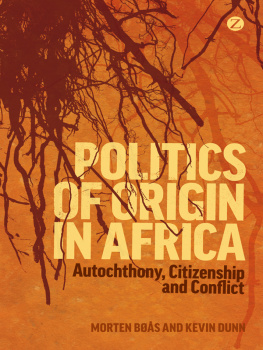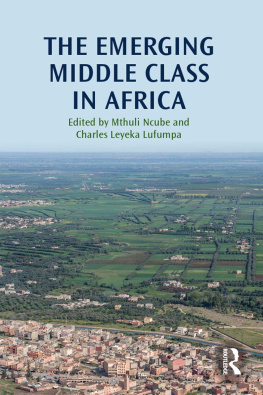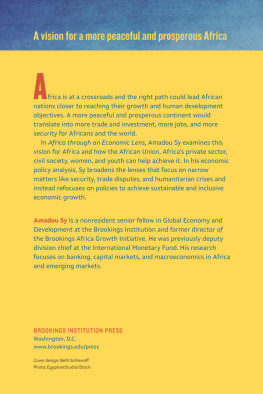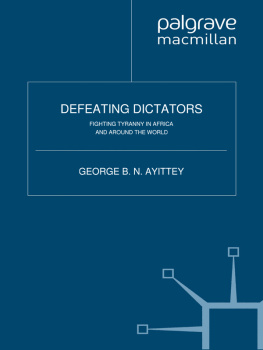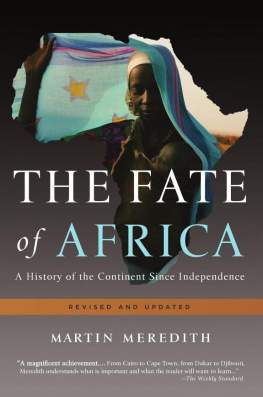
African Arguments
African Arguments is a series of short books about Africa today. Aimed at the growing number of students and general readers who want to know more about the African continent, these books highlight many of the longer-term strategic as well as immediate political issues. They will get to the heart of why Africa is the way it is and how it is changing. The books are scholarly but engaged, substantive as well as topical.
Series editors
RICHARD DOWDEN, Royal African Society
ALEX DE WAAL, W0rld Peace Foundation, Fletcher School, Tufts University
ALCINDA HONWANA, Open University
Editorial board
EMMANUEL AKYEAMPONG, Harvard University
TIM ALLEN, London School of Economics and Political Science
AKWE AMOSU, Open Society Institute
BREYTEN BREYTENBACH, Gore Institute
PETER DA COSTA, journalist and development specialist
WILLIAM GUMEDE, journalist and author
ABDUL MOHAMMED, InterAfrica Group
ROBERT MOLTENO, editor and publisher
Titles already published
Alex de Waal, AIDS and Power: Why There is No Political Crisis Yet
Tim Allen, Trial Justice: The International Criminal Court and the Lords Resistance Army
Raymond W. Copson, The United States in Africa
Chris Alden, China in Africa
Tom Porteous, Britain in Africa
Julie Flint and Alex de Waal, Darfur: A New History of a Long War
Jonathan Glennie, The Trouble with Aid: Why Less Could Mean More for Africa
Peter Uvin, Life after Violence: A Peoples Story of Burundi
Bronwen Manby, Struggles for Citizenship in Africa
Camilla Toulmin, Climate Change in Africa
Orla Ryan, Chocolate Nations: Living and Dying for Cocoa in West Africa
Theodore Trefon, Congo Masquerade: The Political Culture of Aid Inefficiency and Reform Failure
Lonce Ndikumana and James Boyce, Africas Odious Debts: How Foreign Loans and Capital Flight Bled a Continent
Mary Harper, Getting Somalia Wrong? Faith, War and Hope in a Shattered State
Neil Carrier and Gernot Klantschnig, Africa and the War on Drugs
Alcinda Honwana, Youth and Revolution in Tunisia
Marc Epprecht, Sexuality and Social Justice in Africa: Rethinking Homosexuality and Forging Resistance
Lorenzo Cotula, The Great African Land Grab? Agricultural Investments and the Global Food System
Michael Deibert, The Democratic Republic of Congo: Between Hope and Despair
Adam Branch and Zachariah Mampilly, Africa Uprising: Popular Protest and Political Change
Celeste Hicks, Africas New Oil: Power, Pipelines and Future Fortunes
Forthcoming
Keith Breckenridge, Mining, Power and Politics in South Africa: Rethinking the African Resource Curse
Mick Moore, Odd-Helge Fjeldstad and Wilson Prichard, Taxing Africa
Kris Berwouts, War and Failed Peace in Eastern Congo
Theodore Trefon, Congos Environmental Paradox
Published by Zed Books and the IAI with the support of the following organizations:
International African Institute The International African Institutes principal aim is to promote scholarly understanding of Africa, notably its changing societies, cultures and languages. Founded in 1926 and based in London, it supports a range of seminars and publications including the journal Africa .
www.internationalafricaninstitute.org
Royal African Society Now more than a hundred years old, the Royal African Society today is Britains leading organization promoting Africas cause. Through its journal, African Affairs , and by organizing meetings, discussions and other activities, the society strengthens links between Africa and Britain and encourages understanding of Africa and its relations with the rest of the world.
www.royalafricansociety.org
The World Peace Foundation , founded in 1910, is located at the Fletcher School, Tufts University. The Foundations mission is to promote innovative research and teaching, believing that these are critical to the challenges of making peace around the world, and should go hand in hand with advocacy and practical engagement with the toughest issues. Its central theme is reinventing peace for the twenty-first century.
www.worldpeacefoundation.org
About the author
Morten Jerven teaches at the School for International Studies at Simon Fraser University in Vancouver, Canada. He is the author of Poor Numbers: How We Are Misled by African Development Statistics and What to Do About It , and has published widely on African economic development, especially on patterns of economic growth and economic development statistics.
MORTEN JERVEN
AFRICA
Why economists get
it wrong
Zed Books
LONDON
in association with
International African Institute
Royal African Society
World Peace Foundation
Africa: Why economists get it wrong was first published in 2015 by Zed Books Ltd, Unit 2.8 The Foundry, 17 Oval Way, London SE11 5RR, UK
This ebook edition was first published in 2015
www.zedbooks.co.uk
Copyright Morten Jerven 2015
The right of Morten Jerven to be identified as the author of this work has been asserted by him in accordance with the Copyright, Designs and Patents Act, 1988.
Set in OurType Arnhem and Futura Bold by Ewan Smith, London
Index: <>
Cover designed by www.roguefour.co.uk
All rights reserved. No part of this publication may be reproduced, stored in a retrieval system or transmitted in any form or by any means, electronic, mechanical, photocopying or otherwise, without the prior permission of Zed Books Ltd.
A catalogue record for this book is available from the British Library
ISBN 978-1-78360-133-2 hb
ISBN 978-1-78360-132-5 pb
ISBN 978-1-78360-134-9 pdf
ISBN 978-1-78360-135-6 epub
ISBN 978-1-78360-136-3 mobi
Tables and figures
Tables
Figures
Acknowledgments
I have been researching patterns of economic growth in sub-Saharan Africa since I was an MSc student and later a PhD student in economic history at the London School of Economics and Political Science (LSE). During that decade I have received more advice and feedback than I can recount here. I am grateful to the editors at Zed Books and the International African Institute, Ken Barlow and Stephanie Kitchen and the rest of the editorial board, for believing in this book project, and to staff at the Royal African Society and African Arguments for their willing assistance in planning this book.
This is a distilled version of the work I have published on growth in African economies during the past five years. Longer and more technical versions of parts of the arguments I put forward here have been tested and tried in research and review articles published by the Journal of African Economies , Journal of Development Studies , Journal of International Development , African Affairs , Economic History Review and Economic History of Development Regions . I am grateful to the editors of these journals and, of course, to the anonymous reviewers for comments on my manuscript. Finally, and in particular with regards to , I am grateful for the support from scholars and officials I have worked with in Africa and the rest of the world on my quest for transparency surrounding the procedures that generate data on African growth, poverty and development.
Finally, I am most indebted to my loved ones. This book is dedicated to my little ones William and Robin, and my remarkable wife Taraneh.
Introduction
For the past two decades, mainstream economists who study African economic growth have been trying to explain something that never happened ().
Yet only eleven years later, The Economist had a completely different front-page report about Africa as a hopeful continent that was on the rise (
Next page
